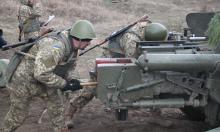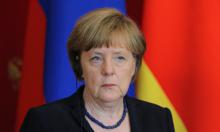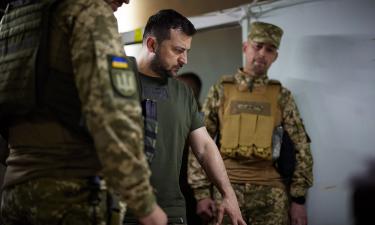Female bomber foiled, second kills Iraqi police
Alert guards gunned down a female suicide bomber who exploded that just before their eyes. But another bomber succeeded, detonating an explosives-laden car at a checkpoint in Ramadi and killing six policemen.
The U.S. commander here acknowledged sectarian violence was on the rise.
Among the day's attacks, gunmen assassinated a local leader of Muqtada al-Sadr's radical Shiite Muslim faction south of Baghdad, and to the north insurgents ambushed an Iraqi army vehicle, killing an undetermined number of soldiers.
As the sun rose, reports also began filtering in of headless corpses and other bodies found dumped around Iraq, many presumed victims of the relentless Shiite-against-Sunni bloodshed.
In an interview with CBS television, Gen. David Petraeus, overall U.S. commander in Iraq, noted that the number of sectarian killings had fallen off after the "surge" of an additional 30,000 U.S. troops began in February, an effort to restore order in Baghdad and nearby areas. But the number rose in May, he acknowledged.
"What all of the commanders on the ground have said repeatedly is that this is going to get harder before it gets easier," he said in the interview Monday.
Figures compiled by The Associated Press showed that at least 2,155 Iraqis were killed last month, making it the third-deadliest month for Iraqis since the AP began tracking civilian casualties in April 2005.
Some Interior Ministry officials put the figure at 2,123 based on police reports. The officials spoke on condition of anonymity because they were not authorized to release the information.
Ministry spokesman Maj. Gen. Abdul-Karim Khalaf insisted Tuesday those figures were exaggerated. He said civilian casualties actually were down 34 percent in May, compared with April, although he refused to provide figures.
The Iraqi government has not released its own casualty figures for months, citing concerns they would be used to portray the security situation negatively.
Suicide bombings continue to regularly claim scores of victims in Iraq's violence, principally aimed at Shiite targets and blamed on Sunni extremists of the group al-Qaida in Iraq. But female bombers remain relatively rare.
Khalaf said a woman clad in a black abaya, the traditional Islamic cloak, approached a group of police recruits in east Baghdad's Canal district about 10 a.m. Tuesday.
"She didn't obey the guards' orders to stop and they shot her and she immediately blew up," Khalaf told The Associated Press.
She was dead at the scene. A police officer witness, who asked anonymity as he was not authorized to talkto the media, said three police recruits were lightly injured.
In early afternoon, a suicide bomber blew up his car at a police checkpoint in the al-Sofiyah area of eastern Ramadi city, 115 kilometers (70 miles) west of Baghdad, said an intelligence officer at the Anbar Salvation Center. He said the blast killed six policemen and wounded three others.
The officer spoke on condition of anonymity. The center is headquarters for a Sunni tribal alliance in Anbar province opposed to the extremist group al-Qaida in Iraq.
In other violence, a Shiite Muslim cleric affiliated with the anti-American Shiite leader Muqtada al-Sadr was shot and killed as his drove his automobile in Jibala, a town 65 kilometers (40 miles) south of Baghdad, police said.
A police officer identified the victim as Sheik Abdul-Rahim Mohammed Naief, in charge of the al-Sadr office in Jibala. Police and local residents accused Sunni extremists from nearby villages of being behind the 7:30 a.m. attack.
The officer spoke on condition of anonymity since he wasn't authorized to speak with the media.
Later in the morning, outside an Iraqi army headquarters in Anah, about 160 kilometers (100 miles) northwest of Baghdad, an army Humvee leaving the base came under rocket-propelled grenade fire that set it ablaze and killed all the soldiers inside, an army officer reported, speaking on condition of anonymity since he was not authorized to speak with the media.
The number of dead was not immediately reported.
In Baghdad, meanwhile, the U.S. command insisted it would continue the search for two abducted U.S. soldiers despite the release of a video Monday by insurgents linked to al-Qaida claiming they had killed the two, along with a third missing soldier whose body was found previously.
The command's attitude was reflected in the field.
"It really doesn't change a thing," said Capt. Aaron Bright, a 10th Mountain Division company commander whose men have spent many days on the search since the soldiers were seized in an ambush south of Baghdad on May 12. Four other American soldiers and an Iraqi were killed in that attack.
"We're still going to continue our search and we're never going to stop until they're found. We'll continue to assume they're alive," Bright said in an e-mail to The Associated Press.
The insurgent video displayed the two missing soldiers' identification cards. "The Americans sent 4,000 soldiers looking for them," an unidentified voice said. "They were alive and then dead." It offered no proof.
Subscribe to Pravda.Ru Telegram channel, Facebook, RSS!





